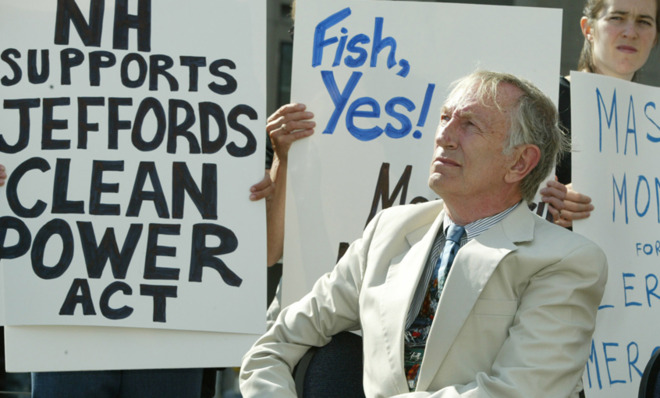The lost bipartisan consensus on climate change
The death of Sen. Jim Jeffords this week underscored that there is no longer a political center on the issue


A free daily email with the biggest news stories of the day – and the best features from TheWeek.com
You are now subscribed
Your newsletter sign-up was successful
This week, Jim Jeffords, the former senator from Vermont, passed away at the age of 80.
Jeffords is perhaps most famous for disrupting the balance of power in the Senate in 2001. Disillusioned with the growing conservative bent of the Republican Party, Jeffords declared himself an Independent in May of that year, undermining GOP control of the Senate.
But Jeffords was also a champion of environmental causes, including sponsoring an aggressive but ultimately quixotic bill to fight climate change that eventually served as an inspiration for President Obama's environmental policy. As a politician who straddled both parties, his legacy underscores the disappearance of the political center in general — and climate change in particular.
The Week
Escape your echo chamber. Get the facts behind the news, plus analysis from multiple perspectives.

Sign up for The Week's Free Newsletters
From our morning news briefing to a weekly Good News Newsletter, get the best of The Week delivered directly to your inbox.
From our morning news briefing to a weekly Good News Newsletter, get the best of The Week delivered directly to your inbox.
Jeffords had a long history of environmental activism in Congress. In 2005, when the Environmental Protection Agency attempted to advance a regulation exempting oil and gas smokestacks from mercury pollution protection measures, Jeffords voted for a resolution attempting to block it, one of only a small number of Republicans to do so. He also voted yes on bills preventing road construction in national forests and the protection of deserts in California.
He was highly critical of the Bush administration's withdrawal from the Kyoto Protocol, asking how the United States could expect other countries to reduce their emissions when the world's largest emitter did not.
By the time Jeffords left the Senate in 2007, the League of Conservation Voters had given him a 78 percent lifetime rating on environmental issues. Only fellow New Englander Lincoln Chafee of Rhode Island scored as high among Republicans or Independents. Fred Krupp, president of the Environmental Defense Fund, lauded Jeffords as a "true champion for the environment" in his condolence statement.
One of Jeffords' lesser known efforts came in 2006, while serving as the ranking member of the Senate Environment and Public Works Committee. In July of that year, he introduced the Global Warming Pollution Reduction Act, which mandated that by 2050 the U.S. reduce its greenhouse gas pollution to 80 percent below 1990 levels. It envisioned a combination of a market-based mechanism of trading pollution allowances (i.e., cap-and-trade) and emissions standards for electrical generation units and automobiles.
A free daily email with the biggest news stories of the day – and the best features from TheWeek.com
In introducing the bill, Jeffords spoke of both the importance of the issue and his faith that the American people had the capacity to solve it: "We can no longer afford to watch from the sidelines. We are a nation of innovators, and we have the skills to develop the technology to make these changes. There will be skeptics. They will tell us we are mistaken, that climate change is a myth. They are wrong."
The cuts envisioned by Jeffords' proposed legislation do not seem quite so aggressive in retrospect. The first milestone would have been a 2020 target date for lowering greenhouse gas emissions to 1990 levels. By contrast, Slate's Eric Holthaus demonstrated that the EPA rules on existing power plants now under consideration — themselves inspired by Jefferson's proposals — would translate into a 3.5 percent cut below those levels by 2020. That would put us a little ahead of where Jeffords had hoped we would end up, thanks in large part to a financial crisis, which depressed energy demand, and the expansion of U.S. natural gas production (especially shale gas).
The law also included a nationwide mandate for using renewable energy: 20 percent of total energy usage by 2020. The U.S. energy mix is currently 13 percent renewable, according to 2013 numbers compiled by the Energy Information Administration (EIA), more than half from hydroelectric. This growth in the deployment of renewables has been supported by federal tax credits, as well as a patchwork quilt of state renewable energy standards (which are legal mandates), goals (which are not), and tax incentives.
By the EIA's estimates, however, we will not quite make it to the level Jeffords envisioned: The United States will still only get about 16 percent of its energy from renewables by 2040, barring significant regulatory action or a breakthrough in technology.
In the end, Jeffords' 2006 bill went nowhere. Despite having several high-profile Democratic co-sponsors, including Sen. Ted Kennedy and Patrick Leahy, it was not even put up for a vote.
Over time, the appetite for bipartisan action to fight climate change has similarly waned. In 2012, nearly all the GOP presidential candidates had to distance themselves from their past support for cap-and-trade. A recent Bloomberg feature found wide support for fighting climate change among former Republican congressional members and aides, but a wariness with regard to addressing it publicly, lest activism on the issue invite a strong primary challenge.
Republicans are not alone. Red state Democrats are under pressure to distance themselves from any serious effort to combat climate change. Even California Democrats, in the middle of one of the worst droughts in the state's history, are reluctant to draw a direct link to climate change as they attempt to unseat incumbent Republicans.
It is therefore worth remembering the career of Jeffords, who was not only at the forefront of environmental issues, but represented a more moderate, less polarized mode of politics that was prevalent a mere decade ago.
Neil Bhatiya is a Policy Associate at The Century Foundation, where he works on issues related to U.S. foreign policy, with a specific focus on South Asia and climate change.
-
 The Gallivant: style and charm steps from Camber Sands
The Gallivant: style and charm steps from Camber SandsThe Week Recommends Nestled behind the dunes, this luxury hotel is a great place to hunker down and get cosy
-
 The President’s Cake: ‘sweet tragedy’ about a little girl on a baking mission in Iraq
The President’s Cake: ‘sweet tragedy’ about a little girl on a baking mission in IraqThe Week Recommends Charming debut from Hasan Hadi is filled with ‘vivid characters’
-
 Kia EV4: a ‘terrifically comfy’ electric car
Kia EV4: a ‘terrifically comfy’ electric carThe Week Recommends The family-friendly vehicle has ‘plush seats’ and generous space
-
 The billionaires’ wealth tax: a catastrophe for California?
The billionaires’ wealth tax: a catastrophe for California?Talking Point Peter Thiel and Larry Page preparing to change state residency
-
 Bari Weiss’ ‘60 Minutes’ scandal is about more than one report
Bari Weiss’ ‘60 Minutes’ scandal is about more than one reportIN THE SPOTLIGHT By blocking an approved segment on a controversial prison holding US deportees in El Salvador, the editor-in-chief of CBS News has become the main story
-
 Has Zohran Mamdani shown the Democrats how to win again?
Has Zohran Mamdani shown the Democrats how to win again?Today’s Big Question New York City mayoral election touted as victory for left-wing populists but moderate centrist wins elsewhere present more complex path for Democratic Party
-
 Millions turn out for anti-Trump ‘No Kings’ rallies
Millions turn out for anti-Trump ‘No Kings’ ralliesSpeed Read An estimated 7 million people participated, 2 million more than at the first ‘No Kings’ protest in June
-
 Ghislaine Maxwell: angling for a Trump pardon
Ghislaine Maxwell: angling for a Trump pardonTalking Point Convicted sex trafficker's testimony could shed new light on president's links to Jeffrey Epstein
-
 The last words and final moments of 40 presidents
The last words and final moments of 40 presidentsThe Explainer Some are eloquent quotes worthy of the holders of the highest office in the nation, and others... aren't
-
 The JFK files: the truth at last?
The JFK files: the truth at last?In The Spotlight More than 64,000 previously classified documents relating the 1963 assassination of John F. Kennedy have been released by the Trump administration
-
 'Seriously, not literally': how should the world take Donald Trump?
'Seriously, not literally': how should the world take Donald Trump?Today's big question White House rhetoric and reality look likely to become increasingly blurred
